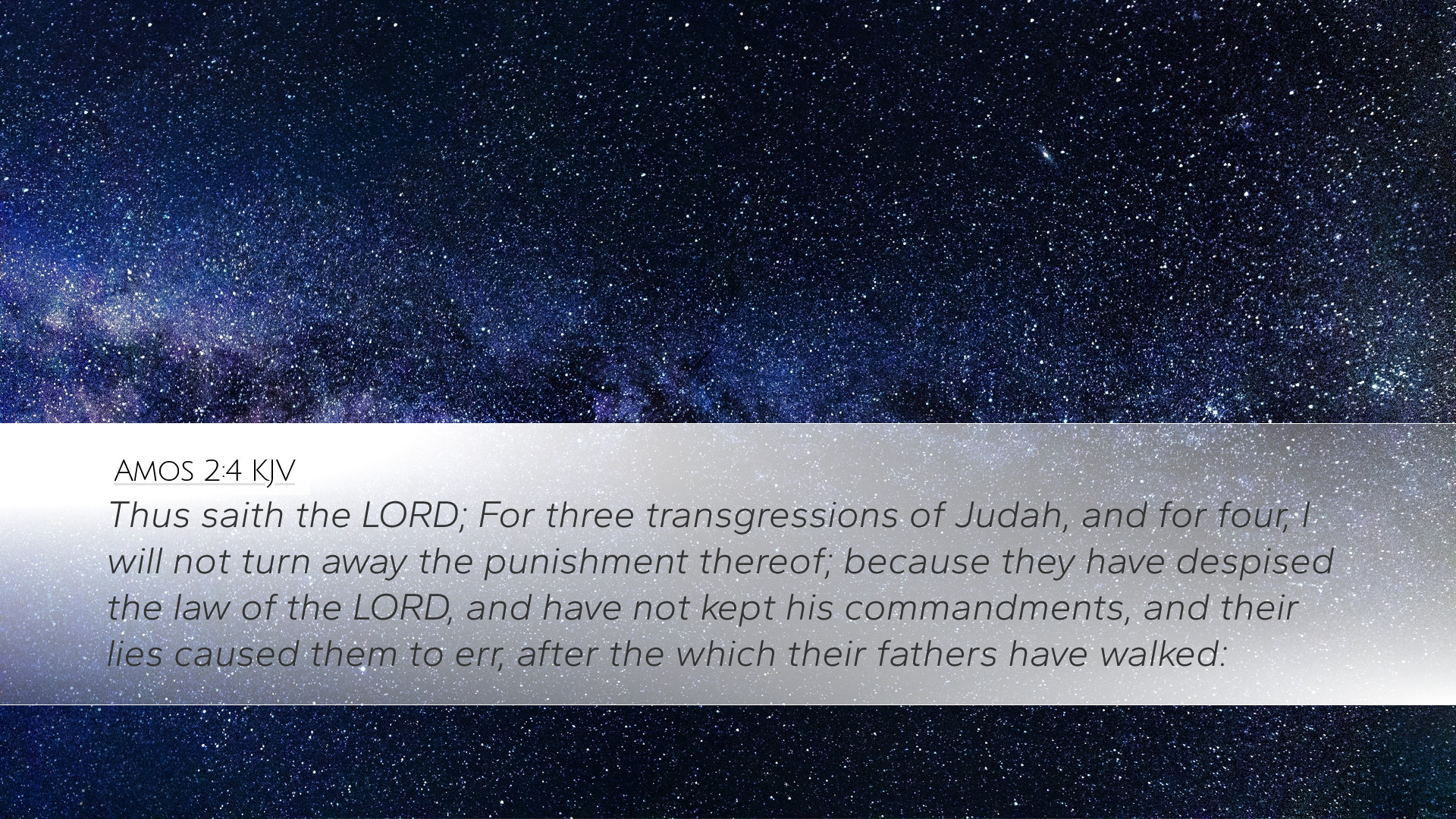Old Testament
Genesis Exodus Leviticus Numbers Deuteronomy Joshua Judges Ruth 1 Samuel 2 Samuel 1 Kings 2 Kings 1 Chronicles 2 Chronicles Ezra Nehemiah Esther Job Psalms Proverbs Ecclesiastes Song of Solomon Isaiah Jeremiah Lamentations Ezekiel Daniel Hosea Joel Amos Obadiah Jonah Micah Nahum Habakkuk Zephaniah Haggai Zechariah MalachiAmos 2:4
Amos 2:4 KJV
Thus saith the LORD; For three transgressions of Judah, and for four, I will not turn away the punishment thereof; because they have despised the law of the LORD, and have not kept his commandments, and their lies caused them to err, after the which their fathers have walked:
Amos 2:4 Bible Commentary
Commentary on Amos 2:4
Amos 2:4 states, "Thus saith the Lord; For three transgressions of Judah, and for four, I will not turn away the punishment thereof..." This verse serves as a solemn pronouncement concerning the impending judgment against Judah, illustrating the seriousness of their transgressions against God.
Context of the Verse
In this passage, the prophet Amos is addressing the people of Israel, presenting a series of oracles against the nations surrounding them. While Israel is primarily the focus of Amos's message, Judah (the southern kingdom) is also called to account for its sins. The significance of mentioning Judah lies in the covenant relationship they have with God and the expectations therein.
Overview of Transgressions
-
Three and Four Transgressions:
The phrase "For three transgressions... and for four" signifies not merely a specific numerical limit but emphasizes the completeness of their iniquities. This idiomatic expression suggests that their sins have reached a tipping point; the continual disregard for God’s laws cannot be overlooked any longer.
-
Particular Sins:
According to Matthew Henry, the sins attributed to Judah include the forsaking of the law of the Lord and the rejection of His judgments (Amos 2:4). Their transgressions not only pertain to idol worship but also to social injustices against the less fortunate, influencing how they relate to one another.
Theological Implications
Amos's proclamation serves as a powerful reminder of God’s holiness and justice. The Lord’s patience with sin is not limitless; rather, He holds nations accountable for their actions. Both Albert Barnes and Adam Clarke stress the theme of divine retribution present in these proclamations. God’s displeasure with His covenant people illustrates the seriousness of sin in the life of a believer.
Divine Judgment
In understanding the implications of divine judgment, it is pivotal for pastors and theologians to communicate that God's judgments are not arbitrary but are a direct consequence of moral and spiritual decay. As noted by Adam Clarke, the use of the term "punishment" signifies that God's actions are justified responses to the rebellion against His holy character.
Moreover, this verse highlights the principle of accountability which resonates through scripture; individuals and nations are held to high standards of conduct that reflect God’s righteousness.
Application for Today
This passage encourages contemporary believers to reflect on their actions and the state of their communities. Pastors should urge congregations to scrutinize their personal lives and collective conduct before God, recognizing that just as Judah faced consequences for their sins, so too could nations and individuals today. Emphasis should be placed on:
-
Repentance:
Turning away from sin and seeking God’s forgiveness is paramount. Amos’s message conveys urgency, expressing that delay in repentance may lead to severe consequences.
-
Justice and Righteousness:
Believers are called to uphold justice and righteousness, especially towards the marginalized and oppressed, echoing the social justice themes evident in Amos’s sermon.
Conclusion
Amos 2:4 serves as a critical reminder of the Lord’s justice and the seriousness of sin, both historically for Judah and contemporaneously for today’s church. The rich insights from public domain commentaries provide depth in understanding the implications of this verse. Pastors, students, and theologians are encouraged to examine the state of their hearts and lives in relation to God’s ethical expectations, embracing the call to justice and repentance that resonates throughout the scriptures.


